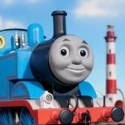|
TinTower posted:The way that TOCs can variate by 5%, does this mean what I think it does and allow them to raise fares on a barely used branch by 1.2% and slap major commuter routes with an 11.2% rise? Theoretically no - like someone said, it's weighted by traffic. Unfortunately, the traffic figures it's weighted by are relatively old so the TOC, with it's near real-time information, therefore knows which lines have grown the most and can absolutely hammer them to maximise the money they get from fare increases.
|
|
|
|

|
| # ? May 24, 2024 15:07 |
|
Bozza posted:I think it sums up the whole problem with the franchising system if First Group get their grubby hands on West Coast. The little scam they pulled with the Great Western should have got them thrown out but no, they're gonna get WCML and look to be moving into the territory of gulping up the whole Network South East system. Bozza posted:Bollocks. It's all just bollocks. e: holy poo poo the spokesman for Virgin Rail on Radio 4 just now saying "if this is how the franchising system works, it's not for us" and saying they're not going to work with the DfT any more because their competitors are making unrealistic bids. So VR are giving up altogether. And now some nasal American fuckwit talking about how much First have suffered from the Government taxing their failings (ie not at all) and Evan Davies saying "it seems to be you don't suffer at all when you lose" Double edit: turns out nasal American fuckwit is Tim O'Toole, head of FirstGroup and former London Underground PPP disaster master in chief. Rude Dude With Tude fucked around with this message at 08:26 on Aug 15, 2012 |
|
|
|
Mahmoud Ahmadinejad posted:Empty quoting is forbidden in D&D, but they've got the WCML. Here's the key part of the bid: Grun posted:FirstGroup said it would add around 12,000 seats, with 11 extra trains, and new services to stations including Blackpool, Shrewsbury and Bolton. It will also strip out catering while reconfiguring the Pendolino trains to add more seats. Also from Tim O'Twat: quote:"We will be making significant improvements including reduced journey times and introducing new direct services. We will improve marketing and deliver a smart ticketing system, refreshed and improved train interiors, station upgrades and even better catering." Trolley service it is then. More later, I gotta go to work and moan about this.
|
|
|
|
Richard Branson uses a lot of words to essentially say 'gently caress this, this process is bent as gently caress':quote:Following the DFT's decision to award the West Coast Mainline franchise to FirstGroup, Sir Richard Branson, founder of Virgin Group, said:
|
|
|
|
Hezzy posted:When I worked as a station supervisor, I heard so many stories of pacers and sprinters literally falling to pieces. Like, I'm talking entire engine blocks falling onto the track and the conductor watching as it slowly disappears off into the distance. Please post more of these stories because they are great
|
|
|
|
OK, lets break down some of these words from Branson:quote:“We won the franchise in 1997 with an agenda to change radically the way people viewed and used the train. At the time the track was run-down, staff demoralised, the service riddled with delays and reliant on heavy subsidies. We set hugely challenging targets to dramatically speed up journey times with modern tilting trains, increase the frequency of the service, improve the on-board experience; as well as double passenger numbers and return the line to profit. The service is still up to this day reliant on heavy subsidies, as Private Eye have detailed over the past few years. The WCML upgrade was late, over budget, riddled with problems. quote:“I am immensely proud of our staff for turning the West Coast line from a heavily loss-making operation into one that will return the taxpayer billions in the years to come. Last year we paid a net premium of £160 million to the taxpayer and have created a franchise worth more than £6 billion which is hugely valuable to the country. WorstGroup will be awful. But Virgin were not perfect.
|
|
|
|
If you flick back to the OP, there is an excellent Guardian investigation into the WCML gently caress up. Well worth the read.
|
|
|
|
I'm going to read that again, it was fantastic. But still, if the net result of today's news is everyone going "oh god this is terrible Virgin were so good" I'll be pissed off. Because they loving weren't.
|
|
|
|
I find it really loving hard to believe that poo poo Bransoon says about being the best long distance carrier or whatever. I have venomous memories of being stuck on a four car voyager train that ran a route from penzance to edinburgh (or some other massively northern city) that was regularly rammed to capacity all the way through. I cant imagine what it was like for people going all the way but standing for three hours plymouth-birmingham is a memory that will never fade for all the wrong reasons.
|
|
|
|
Zero Gravitas posted:I cant imagine what it was like for people going all the way but standing for three hours plymouth-birmingham is a memory that will never fade for all the wrong reasons. I got a Virgin train from Birmingham to Durham once. Well, I say to Durham... What happened was there were gale-force winds that started blowing the roof off York station, leaving only two platforms usable, so the trains had to queue up to enter the station, where staff would escort passengers off the train and then on to the train. (Because if a piece of roof is about to land on your head, having a member of staff next to you helps how?) And then, two hours late as we were, the powers that be decided that the train wouldn't carry on it's full journey to Edinburgh and would in fact terminate early, at Darlington. Which meant yet another wait, this time at a freezing cold train station, for the next train to arrive. I think I ended up arriving 3 hours late. The trains were pretty packed that day.
|
|
|
|
Bozza posted:If you flick back to the OP, there is an excellent Guardian investigation into the WCML gently caress up. Well worth the read. Bozza, I don't know if this is something you are qualified to talk about, but can you discuss why the railway in the US is so completely terrible? I imagine it is a combination of the aversion that the average American has to public transportation, but even so, there are several parts of America where there is a high density but public transportation is still absolutely awful.
|
|
|
|
The reason there's sod all urban transit in American cities is because of General Motors: http://en.wikipedia.org/wiki/General_Motors_streetcar_conspiracy, and it's a lot easier to rip tracks up than it is to put them back in. I have no idea* why the US hasn't invested in public high speed rail links up and down the West and East coasts though, rather than all the stuff that's owned by companies (and let their trains have priority, thus loving over Amtrak's service) *It's probably nimbyism
|
|
|
|
People with the nicest long distance trains in the UK are Grand Central and East Midlands Trains because they both use HSTs with the original seating layouts. The Mark 4s they use on East Coast are pretty good if they're in the original layout too, but I'm not sure they are. re: USA, not really sorry, not without a fair bit of research. Generally though, the USA had a large infatuation with the car and an incredibly strong car lobby which devestated their steel on steel public transport.
|
|
|
|
Zero Gravitas posted:I find it really loving hard to believe that poo poo Bransoon says about being the best long distance carrier or whatever. I have venomous memories of being stuck on a four car voyager train that ran a route from penzance to edinburgh (or some other massively northern city) that was regularly rammed to capacity all the way through. I cant imagine what it was like for people going all the way but standing for three hours plymouth-birmingham is a memory that will never fade for all the wrong reasons. Technically that was Virgin's other franchise, Virgin CrossCounty, which they lost in 2007. They were largely responsible for the incredibly short trains put on that route which Arriva's CrossCountry still has to deal with. While I'm hesitant to ever praise Virgin Trains too much, their West Coast franchise (or indeed any other franchise at all) is/was better run, and despite the branding was pretty separate. You can also blame Northen Rail's shiteness mostly on lack of any investment from the past 30 years.
|
|
|
|
Re: USA There is a general conception by everyone that rail in the US is poo poo. Yes this is very true for passengers outside of the North East, but for frieght it is actually quite excellent. If you look at % of goods traveling by rail in the US, rail is the largest single sector at somewhere between 30-40%. I think this figure is dropping, but in the EU it is as low as 8%. Thoughout the US's rail development the big rail companies focused mostly on long distance traffic for both freight and passengers, with suburban needs fulfilled by tram-like systems. Car and air travel then replaced most passenger traffic over the last half of the 20th century for loads of legitimate and illegitimate reasons. Once the commuter systems had gone, then the cities began to spread out, making it almost impossible to rebuild an effective commuter rail system that requires some amount of population density. Additionally, factories in the US developed at the same time as the railway, meaning most had a direct rail connection. In places like Britain, many factories developed before the railway, and so had to make an additional journey to and from to goods terminal at either end. When road took off, it was akin to taking out the middle man rather than switching mode completely. Today rail freight is still hugely important over there, being ideal for very large shipments over very long distances. Over here in Europe the railways focused on passengers, which don't run well with freight at the same time. If you look at the average freight train in America you can see that is on a completely different level to anything you get over here. But having loads of huge trains like that does not mesh well with a fast or reliable passenger service. Not to mention that the freight companies still own their tracks, and are far more interested in making sure that their cargo is delivered on time rather than that Amtrak train over there that has already been delayed by 9 hours. Over in the North East, where Amtrak have control of the rails, there is almost a 'European' level of service running between the major metropolitan areas, and so there passenger rail is ok. They even have trains that go 150mph, faster than everything other than a Eurostar in the UK! Any major improvement in long distance rail travel in the US would require a new network of rails, which would be in the form of High Speed rail these days. I think the perception of Amtrak over the last 50 years means that there is not much public demand for rail there, especially when they love cars so much while being so spread out. Most people in the US never go on a train in their entire lives, its just this thing that will make them wait for 5 minutes at a level crossing as a endless freight train slowly rumbles past. nozz fucked around with this message at 13:05 on Aug 15, 2012 |
|
|
|
This might have already been covered, but can anyone explain why when they privatised British Rail they went with the eccentric system we have, rather than simply selling off British Rail in one chunk, like they did with BT or British Gas? Was it simply a case of them being able to extract more profit for more private companies or something else? I've never seen it explained anywhere...
|
|
|
|
Andy Impey posted:This might have already been covered, but can anyone explain why when they privatised British Rail they went with the eccentric system we have, rather than simply selling off British Rail in one chunk, like they did with BT or British Gas? The idea was so there was a pool of "competing" rail companies. This "competition" would drive them to improve their service and drive down costs. The problem is that first they aren't competing directly against each other and the franchising process is a shambles. Currently the franchise bidding process is the only time where the ToCs compete with each other directly. This process could be used to steer business away from under-performing companies or from companies gaming the system but all that needs to be said about that is that First Group just won another major franchise after shafting the government at every turn. [edit] To elaborate, First group got additional support payments from government because they couldn't make enough money based on what they bid and the agreement they signed. In a sheer coincidence the additional support payment (I believe last year) matched more or less exactly the special dividend paid out to shareholders for that period. They also cut short their contract on another franchise where their back-loaded payments to the government were supposed to kick in and because the government couldn't find someone to take over on that short of notice they made a special arrangement with First to continue providing the service but without having to make the promised payments. etc etc Munin fucked around with this message at 15:01 on Aug 15, 2012 |
|
|
|
Gat posted:Any major improvement in long distance rail travel in the US would require a new network of rails, which would be in the form of High Speed rail these days. I think the perception of Amtrak over the last 50 years means that there is not much public demand for rail there, especially when they love cars so much while being so spread out. Most people in the US never go on a train in their entire lives, its just this thing that will make them wait for 5 minutes at a level crossing as a endless freight train slowly rumbles past. Long distance (400 miles or more) is pointless to encourage anyway, other than as a scenic vacation mode of travel. It can never be time-competitive with plane travel (although shorter ones, especially under 150 miles can easily be. You don't need to arrive an hour early at the train station to do security checks!) and is rarely price competitive (though in America there's weird cases where it can be). Certainly once you get past 600 miles there's not even a chance. And further, the money you'd spend to make long distance better would be FAR better spent building commuter/local services, which is what are really needed - any given person might take 2 or 3 long distance trips a year, but they're commuting every workday and going into the city on a lot of weekends. And it's all even more reason to keep private carriers out of the business of passenger rail transport.
|
|
|
|
Is Branson actually boasting about Virgin dominating the rail 'market' between Manchester and London? When the alternative is what? East coast mainline to York then the cross pennine line to Manchester?
|
|
|
|
Thus franchise system is stupid.
|
|
|
|
How are jobs and stuff handled when one franchise is being passed from one company to a new one? If you're a conductor on Company A and Company B buys out the franchise you're in, do they shuffle you to Company A in another franchise area (if A has one) or does B have to hire you, or do you just get fired?
|
|
|
|
Ahahah Branson you big baby @jonsnowC4: Branson tells me on C4 News that Cameron has to pick up the phone and apologise to him before he will bid for anoither rail franchise 
|
|
|
|
Install Gentoo posted:How are jobs and stuff handled when one franchise is being passed from one company to a new one? If you're a conductor on Company A and Company B buys out the franchise you're in, do they shuffle you to Company A in another franchise area (if A has one) or does B have to hire you, or do you just get fired? I was talking to a conductor about this the other day and he told me that drivers, conductors and platform staff are all moved to the new company, so the Virgin employees will become part of FirstGroup. Managers stay with their current company so they'd have to move or find new jobs. Now, to make sure everything is hunky dorey (different companies have different pay scales, benefits, bonuses, etc) there is a period of "Harmonsation" which starts with drivers. They all sit down and hash out what they want their new contracts and conditions to be, in theory they pick out the best conditions from both companies. Then conductors do it, followed by platform staff. It's advantageous to keep the current staff because nobody at FirstGroup will be certified in the WCML route, so they'd have to learn it. They've also never worked a Pendolino or Voyager so they would have to be trained up on that too. Basically, all that will change for the staff is they'll be wearing new uniforms and they might get paid more money, or have better holidays. I haven't talked to anyone who has been negative about the harmonisation process, so I guess it's a good opportunity to improve working conditions. The new company wouldn't want to piss off it's new employees from the get go, so it's likely they'll concede to pay more money or give more holidays, etc. I recently read that RMT are gearing up for some hot debates because FirstGroup are stripping out the on-board catering for WCML, which will lead up to 800~ lost jobs. Catering staff are not part of the harmonisation process so they don't get a say in anything. Hezzy fucked around with this message at 20:36 on Aug 15, 2012 |
|
|
|
Munin posted:The idea was so there was a pool of "competing" rail companies. This "competition" would drive them to improve their service and drive down costs. Let's not forget John Major was an honest-to-god trainspotter in his youth, and genuinely believed that breaking them up in this way would rekindle the days of the Big 4, with them competing out of pride to be the fastest, cheapest and best. Mix that with his Tory conviction that the post-War nationalisation had ruined the railway system and it's pretty easy to see where this was going. To this day there's probably some sad bewildered part of his soul wondering why the ECML and GW franchises aren't competing to have the fastest train any more. Interesting question - given that one of the main reasons the Tories have given for continually allowing above-inflation train rises is that it would be "relieving the burden" on taxpayers of subsidising the railways, ignoring the large indirect (and sometimes direct) subsidies given to road and air transport, how much actual subsidy per passenger-mile do the train companies get on average? (Inevitable followup - how does that compare to other European nations with actual functioning railways?
|
|
|
|
goddamnedtwisto posted:Let's not forget John Major was an honest-to-god trainspotter in his youth, and genuinely believed that breaking them up in this way would rekindle the days of the Big 4, with them competing out of pride to be the fastest, cheapest and best. Mix that with his Tory conviction that the post-War nationalisation had ruined the railway system and it's pretty easy to see where this was going. To this day there's probably some sad bewildered part of his soul wondering why the ECML and GW franchises aren't competing to have the fastest train any more. Major wanted the whole thing broken up into the big 4 basically, with seperate rail and infrastructure components, however he was talked round by the Adam Smith Institute that this wouldn't work so he needed to go further, with competing rolling stock companies, one large infrastructure manager and lots and lots of TOCs (I believe 20 something?) because this would be totes amazeballs and the magic of the free market would shine apon it. Yeah. As for the transfer process, while some of what Hezzy said is correct, except a lot of the lower and middle management will go in too under TUPE arrangements. Board and exec level will be made redundant I think, though some of the exec might get brought in if they are technical / operational experts, but the rest will be getting their P45.
|
|
|
|
goddamnedtwisto posted:
Well for a start... http://www.dft.gov.uk/publications/dft-business-plan-indicators-input-01/ If you are comparing to other countries I guess you need to factor in the subsidies to Network Rail as well. A quick search couldn't find any easily comparable figures with other systems.
|
|
|
|
Gat posted:Well for a start... http://www.dft.gov.uk/publications/dft-business-plan-indicators-input-01/ CP4 at Network Rail was about £36bn, which covers 2009-2014.
|
|
|
|
Bozza posted:CP4 at Network Rail was about £36bn, which covers 2009-2014. Apologies for my ignorance but what is CP4? It doesn't ring a bell for me.
|
|
|
|
Munin posted:Apologies for my ignorance but what is CP4? It doesn't ring a bell for me. CP is Control Period, 4 cos it's the 4th one. It's basically the block grant NR gets every 5 years after about a years worth of arguing with the ORR and DfT on their spending. There was a big focus on 'efficiency' in the CP4 application so now when carrying 4 pints back from the bar instead of 3 you can 'hilariously' call it "CP4 efficient" etc... Railway humour right here ladies and gents.
|
|
|
|
Thanks for the answers everyone, this thing is far more hosed up and idiotic than I thought. The chances of this ever being sorted our are less than zero, right?
|
|
|
|
Regarding the US: Freight usually got the priority, although oddly enough Obama has forced freight companies to prioritized passenger travel to a much higher degree than previous presidents and transit times have improved. Inter-city rail travel in the US is probably going to be remain regional at best, American cities are just too spread out along the continent to make a integrated system work unless there is a dramatic increase in speeds. High speed rail makes sense in a couple regions: California/Nevada, Boston to Washington, and Vancouver to Portland/Eugene Oregon and maybe Chicago to some nearby cities. However, you need population density and proximity for rail travel to make sense and there only certain "sweet-spots" where it is possible. There are plans on the drawing board to construct systems in those regions, California is about to break ground soon on its HSR rail-line in the near future, however capital costs are going to be high and it is going to take time to construct new lines. The East Coast has an express train capable of near-HSR speeds, but because of the age of the lines it runs, it has to run at reduced speeds. This is being corrected but it is a gradual process. In the next 10-20 years, I think things will improve but there is a lot of resistance against putting real capital investment. In addition, Amtrak (an Public corporation that runs passenger service in the US) is seeing higher ridership, it is still unable to turn a profit and has to be subsidized. It is interesting, because rail travel in the US was seen as unprofitable, operation was offloaded on the public in the 1970s but because of that decision, at least some basic intercity travel was preserved and rail transit is still in public hands even though it is starved for investment. Regarding urban transit, the US probably has more urban-rail that one would expect and there is a wide range of transit investment across the US. While Europe investment has historically has been far more robust, most American cities are trying to develop some type of rail system in addition to their buses, even Los Angeles and Houston. New York's rail system is probably comparable to most of the top global systems. DC has a fairly decent subway system that has significant gaps but is functional. Chicago's system is reliant on old elevated lines for the most part, but has a very comprehensive commuter rail network. Los Angeles is desperately trying to build a system, but the region is so vast that it is going to take decades. Really, the US just needs better funding and thats largely a issue because of the American political system.
|
|
|
|
Ardennes posted:Inter-city rail travel in the US is probably going to be remain regional at best, American cities are just too spread out along the continent to make a integrated system work unless there is a dramatic increase in speeds. High speed rail makes sense in a couple regions: California/Nevada, Boston to Washington, and Vancouver to Portland/Eugene Oregon and maybe Chicago to some nearby cities. However, you need population density and proximity for rail travel to make sense and there only certain "sweet-spots" where it is possible. Ardennes posted:In addition, Amtrak (an Public corporation that runs passenger service in the US) is seeing higher ridership, it is still unable to turn a profit and has to be subsidized. Ardennes posted:Really, the US just needs better funding and thats largely a issue because of the American political system. What we need is political will. The Republican governors obviously don't have it, but the Democratic governors tend to be pretty weak as well, and the feds have done little either.
|
|
|
|
Train travel shouldn't need to be profitable anyway. Public transit in general should be far more focused on serving the public than being profitable.
|
|
|
|
Install Gentoo posted:Train travel shouldn't need to be profitable anyway. Public transit in general should be far more focused on serving the public than being profitable. Asking for public transit to be profitable is always a red herring. It's not like concrete roadways are expected to be profitable. They're a public good that engender broad societal benefits. Kaal fucked around with this message at 18:16 on Aug 16, 2012 |
|
|
|
Golbez posted:Regional, yes, but you eventually build the network. Start with California, Ohio, Texas, the northeast, and the Midwest... and then, hey, look, you linked Kansas City to Chicago, and Kansas City to Oklahoma City... and suddenly, you have a network! Now, not many people are going to go from Houston to Chicago by train, that's what air is for, but the presence of the large network opens up a lot of possibilities. Being in Cedar Rapids, I couldn't really hope for a train to Chicago - but when one gets built between Omaha and Chicago, I'll be able to hop on it. I would spend 10x more time in Chicago and Minneapolis if I could get there in 90 minutes instead of a 4 hour drive. Flying is right out. That might be possible some day but at this point, I think it is going to take a lot of effort just to get real HSR in California/Eastern Corridor and make some express trains elsewhere. What the US needs is a proof of concept (Acela is actually one already, it just isn't advertised) that can show HSR won't be a dramatic burden. The problem is messaging. quote:On the rest of the network it's forced to run, yes. But last I heard, Acela was one of its two profitable links (the other being the Auto Train). My mom, who worked at Amtrak back in the 80s, said the sentiment was generally to regard Congress as a horrible beast that was getting in the way of them actually running a train service, what with all the bad links (that run through committee member districts, of course) and stuff. It is probably a good thing those routes were ultimately saved since it has allowed the US to retain service (of some type) in most states, but issue is that congress forces Amtrak to provide service then bitches about subsides (which are pretty minimal). It looks like the conservation has had a bit of an American hijack, but I don't know if there is enough interest in a separate American rail/transit thread. Edit: I have a question, how much per a year does the British government (through the dept of transport) spend on rail as a whole (including subsidies/rail management)? Ardennes fucked around with this message at 18:54 on Aug 16, 2012 |
|
|
|
Ardennes posted:I have a question, how much per a year does the British government (through the dept of transport) spend on rail as a whole (including subsidies/rail management)? I'm not sure (because of the way Network Rail is funded) but a figure that's often thrown around is we spend three times as much paying private companies to run the railways as we did when we just ran the railway. Because of free market efficiency and choice, or something.
|
|
|
|
High speed rail is ALWAYS a red herring. The majority of travel in any country is relatively short distance commuting and shopping. And you can't maintain high speed speeds when you have to have your train stopping every 5-15 minutes for the next station, which is what you need to adequately serve the majority of travel. Say you live 30 miles from the city you commute to. If your train averages 80 mph on the way there, then hell that's already a lot faster than it's legal to drive probably, and you're there in 22 minutes. Drive that in average traffic and you'll probably take twice as long if not more. Building out a total of say, 200 miles of new routes for service in and around a city is a much better use of resources than building or upgrading 200 miles of route to a high speed standard. You'd get way more people using that than the high speed intercity route. Like consider Japan, they have the Shinkansen which is of course their absurdly fast and extensive high speed rail network. But out of 22.24 billion passenger trips taken in a year on their whole rail network, only 151 million of them were on the high speed rail. That's about 0.6% of the trips taken. Nintendo Kid fucked around with this message at 19:28 on Aug 16, 2012 |
|
|
|
Install Gentoo posted:High speed rail is ALWAYS a red herring. The majority of travel in any country is relatively short distance commuting and shopping. And you can't maintain high speed speeds when you have to have your train stopping every 5-15 minutes for the next station, which is what you need to adequately serve the majority of travel. This is interesting, but in a country this size couldn't a good, affordable high speed rail network effectively eliminate internal flights, with all the benefits that brings? Edit in response to your edit: I'd love to know the equivalent figures for the UK. Long distance trains (London to Edinburgh, Devon, Manchester) always seem full to me, but that may just be because we're bad at those too. Bobstar fucked around with this message at 19:32 on Aug 16, 2012 |
|
|
|
Install Gentoo posted:High speed rail is ALWAYS a red herring. The majority of travel in any country is relatively short distance commuting and shopping. And you can't maintain high speed speeds when you have to have your train stopping every 5-15 minutes for the next station, which is what you need to adequately serve the majority of travel. At least in the proposed California High Speed train that within Urban SF/SoCal, that the new track would double for local service (either the HS trains themselves or smaller local trains). Urban transit is ultimately more important, but within the US urban transit suffers problems. Also there is sort of unspoken assumption: that high speed rail services are likely profitable and that profit can be used to subsidize other lines. Acela isn't even a real HSR but it is popular and profitable enough to subsidize Amtrak to a significant degree. I don't think HSR makes sense everywhere, but there is certainly places where there is potential.
|
|
|
|

|
| # ? May 24, 2024 15:07 |
|
Install Gentoo posted:High speed rail is ALWAYS a red herring. The majority of travel in any country is relatively short distance commuting and shopping. And you can't maintain high speed speeds when you have to have your train stopping every 5-15 minutes for the next station, which is what you need to adequately serve the majority of travel. I think the reason people focus on HSR in the US is because the suburban sprawl makes commuter rail in a lot of the country totally infeasible. Much easier to set yourself a relatively achievable goal like eliminating some domestic air travel than to attempt to challenge 50 years of received town planning wisdom. Jonnty fucked around with this message at 20:18 on Aug 16, 2012 |
|
|
























